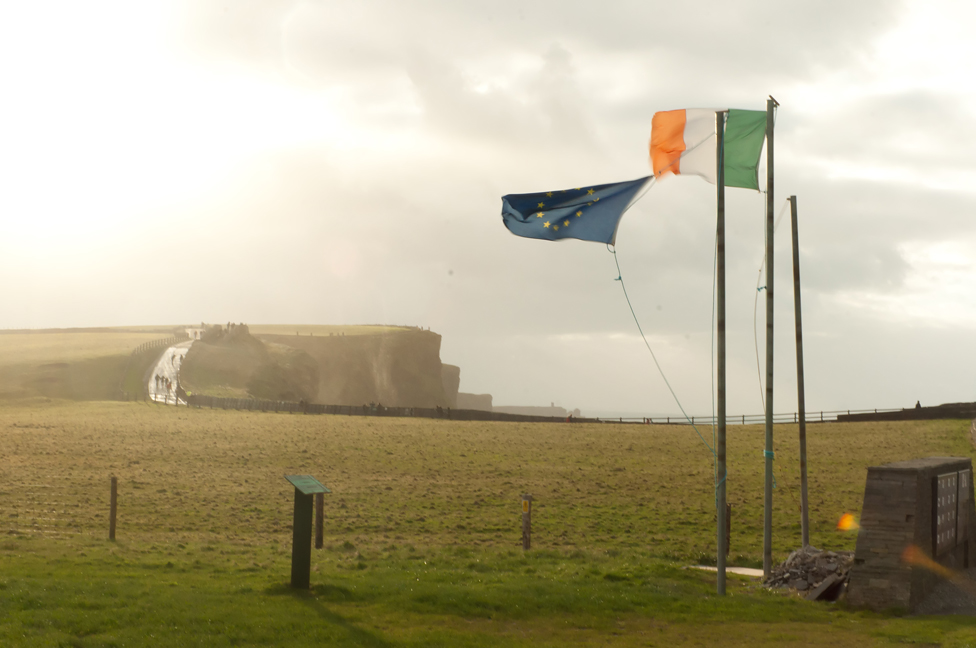
On the first of June, my family took our first cab of the vacation from Dublin Airport to our hotel in the city center. After exchanging small talk about the weather, my father asked the driver about the Irish economy. ‘It’s a joke’ he responded, laughing. He then explained that his daughter and her husband were denied financing on a home because their jobs – which they’d held for five years – had yearlong renewal terms. This denial, as well as a number of other financial woes, had led the couple to conclude that in order to afford Ireland later in life, they needed to move to Canada to make some money first.
My father then asked the cabbie whether, knowing what he knows now about Ireland’s economy, he would have wanted to switch from the Irish pound to the Euro in 1999. He emphatically responded, “No.”
Despite pervasive popular cynicism over the economy, Ireland’s GDP is expected to grow 6.5% this year; things are looking up for the Irish. But before drawing any rash conclusions on what the current economy implies about Ireland’s future, Ireland’s strong historical ties to the economies of other countries should be examined.
The Irish currency converged with the British pound sterling in 1826. The Republic of Ireland declared independence from Britain in 1922, and the Irish pound was established with the Currency Act, 1927. Despite political independence, the Irish pound was still linked directly to sterling and was backed by the British banks. In 1978, Ireland joined the European Monetary System and the UK did not; when sterling boomed at a rate faster than any currency in the new European Monetary System, Ireland was forced to sever its ties with the British pound.
Ireland toyed with joining the Economic and Monetary Union throughout the ‘90s, one of its primary concerns being whether the UK would also join. Many economists made “with the UK” and “without the UK” synonymous with “pro” and “con”, even though both scenarios appeared to benefit Ireland’s economy. In 1999, the Economic and Monetary Union Act declared that Ireland’s official currency would be the Euro.
Meanwhile, Ireland’s economy had been growing into the formidable “Celtic Tiger.” Between the years of 1993 and 2000, average GDP annual growth was close to 10%.
As with most extreme booms, however, Ireland’s came with a heavy bust. Property prices began to dip in 2006, and when the United States’ market crashed in 2008, Ireland’s burned. The country became the second Euro-zone state behind Greece to accept a bailout from the EU and IMF.
Today, Ireland’s economy is ostensibly growing, as are most EU countries that have received bailouts (the odd one out being Greece, of course). But the Irish are still walking a tightrope. In order to stay afloat in the next decade, the Irish have to dodge three possible disasters: crashing their own economy, the UK leaving the EU and the Eurozone disbanding.
The first threat, another crash similar to the death of the Celtic Tiger, is domestic and hopefully more easily avoided. According to “Ireland’s Competitiveness Scorecard 2015” by the National Competitiveness Council, Ireland needs to double their current efforts – increasing tourism and exporting businesses, for example – to become a financially competitive nation. The council’s chair, Peter Clinch, worries that much of Ireland’s recent growth is due to lower oil prices and a weaker Euro. These temporarily positive yet unstable factors hide Ireland’s underlying issues: a high-cost destination for businesses, high unemployment rates, poor labor force performance and limited exports. Ireland is not currently on a trajectory towards failure, but if the country is too busy celebrating its momentary gains, it will collapse just like in 2008.
The second scenario is the UK leaving the EU. Britain’s Prime Minster, David Cameron, ran his last campaign on a promise to put the UK’s membership in the EU to a vote. The referendum will take place by the end of 2017. Cameron is pushing to merely fight for reform, but there are many politicians calling to pull out of the EU entirely. The Irish Times claims that a “Brexit” from the EU “could irrevocably damage Ireland’s agricultural trade with Britain and cause an outflow of business from Dublin’s financial services centre,” which would seriously wound the Irish economy.
The Irish have made strong attempts to cut ties with England, as evidenced by the brief Irish currency history laid out above, but the Irish economy still depends heavily on trade with the British. Experts believe that if the UK were to leave the EU, they would set up a free-trade deal similar to that of Switzerland and Norway. To survive, the Irish would need to have a front-row seat at that negotiation to ensure that agricultural trade is maintained between the two countries. This front-row seat is far from guaranteed, however, because while the UK values trade with Ireland, Ireland relies on it; 34% Ireland’s imports come from the UK, but Ireland is only the UK’s fifth largest export market.
In addition, Dublin’s International Financial Services Center (IFSC) is kept busy largely by London’s status as a financial capital of Europe. London’s financial power could be threatened by an exit from the Eurozone, thereby threatening the IFSC.
Finally, there is the possibility that maybe the entire Eurozone idea wasn’t viable from the get-go. Most calls for disbandment of the Eurozone are extremist ones, but the problems facing the currency bloc right now are vast and serious. The Irish are keenly aware of how a Greek exit from the Eurozone would have directly affected them, including a loss of €350 million on a loan extended to the Greeks in a preliminary round of bailouts. The turmoil with Greece has also left corporations feeling wary about the Euro, leading to investment outside of the Eurozone. Moreover, Europe is still struggling with populists who aren’t the Euro’s biggest fans. Without the Euro in 2008, Ireland might not have recovered as quickly as they did. It is unclear whether an economy as small as theirs would be able to make as quick of a recovery as other countries with a historically well-established currency if the Eurozone were to disband.
Ireland, then, is left in a state of anxiety. While each of these events may be unlikely as standalones, the probability of one of them happening in the next decade is high enough to put the country on alert, especially considering that they can’t really do anything to prevent two of the three. Seeing as Ireland only functioned on its own currency for 23 years prior to the Euro, their state of anxiety is justified.
The views expressed by the author do not necessarily reflect those of the Glimpse from the Globe staff, editors, or governors.






